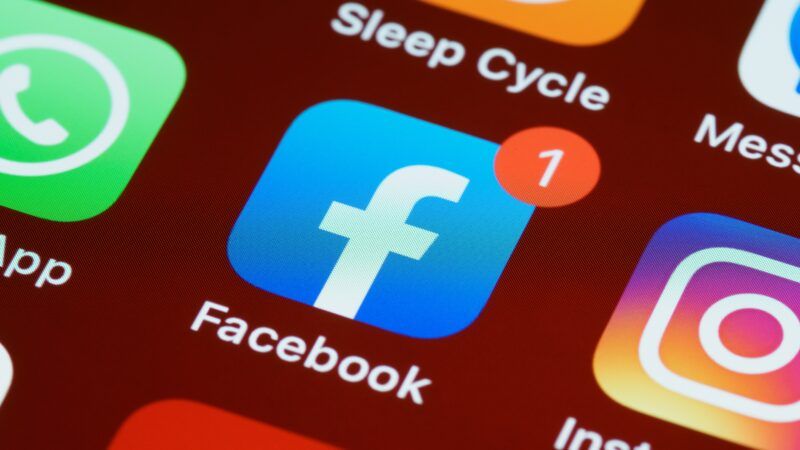The Death of BuzzFeed News Was a Facebook Murder-Suicide
Online media companies got exactly what they said they wanted.

BuzzFeed News is closing up shop. Web visitors can still find all the quizzes and listicles they have come to love—those exist on the nonnews side of BuzzFeed—but the journalism division is shuttering.
The death of BuzzFeed News marks the definitive endpoint of a certain form of social media–driven, millennial-centric journalism; as such, it is being eulogized by many former contributors, including Charlie Warzel, who correctly observes that "The Internet of the 2010s Ended Today." Ben Smith, the former editor in chief of BuzzFeed News who infamously published the Steele dossier—a substantially discredited intelligence document that sought to tie former President Donald Trump to Russian President Vladimir Putin—and current Semafor editor in chief lays the blame at the feet of social media. BuzzFeed News' doom was at hand, he writes, "when consumers found their Facebook feeds toxic, not delightful; when platforms decided news was poison; and when Facebook, Twitter, and the rest simply stopped distributing links to websites."
Smith's version of events is absolutely correct. The centrality of Facebook to the distribution strategies of online news outlets over the past decade cannot possibly be overstated; ask any journalist who worked on the dot-com side of a publication from 2010 until 2019 or so, and he will say that referrals from Facebook constituted the bulk of web traffic during that period. Once platforms "decided news was poison," as Smith puts it, the party was effectively over.
But Smith glosses over an important step. Social media platforms didn't just wake up one day and decide that's it—no more news content. On the contrary, they were bullied into submission.
And the bully? Well, that was the mainstream media. Any story that attempts to explain the abrupt collapse of the online journalism model must reckon with the media's starring role in its own demise. If BuzzFeed News–style journalism is dead, it was a murder-suicide.
Here's what happened: Until 2016, people generally thought of social media as a good thing. Even its impact on the political process was viewed positively; Barack Obama's successful cooption of online networks for his own purposes was widely celebrated in the media. (Obama's efforts were greatly advantaged by the fact that Chris Hughes, one of the co-founders of Facebook, left the company to work for the campaign—a move that no one at the time viewed as particularly nefarious.)
Then Trump got elected. In the desperate search for answers as to how this could have possibly happened, many in the mainstream media quickly landed on it's all Facebook's fault. The idea that Mark Zuckerberg, insufficiently attentive to content moderation, had allowed malignant Russian accounts to infect his platform and subvert American democracy became the preferred narrative. James Clapper, former director of national intelligence during the Obama administration, eventually told The New Yorker, "I think the Russians have more to do with making [Hillary] Clinton lose than Trump did." Clinton herself said that Zuckerberg should "pay a price" for damaging the country.
The sheer volume of articles from mainstream, progressive, prestigious outlets accusing Zuckerberg of complicity in the end of the American experiment is astonishing. Here is by no means an exhaustive list:
- "What Facebook Did to American Democracy" — The Atlantic
- "Facebook Has Been a Disaster for the World" — The New York Times
- "Mark Zuckerberg Has Set Our Democracy on Fire" — The Nation
- "Can Mark Zuckerberg Fix Facebook Before It Breaks Democracy?" — The New Yorker
- "Facebook harms children and weakens democracy: ex-employee" — BBC
It should be noted that the specific accusation of Russian malfeasance on Facebook as an important cause of democratic subversion is not particularly well-supported by evidence. Subsequent studies have shown that foreign influence on social media was less effective and widespread than previously believed, and so-called election interference operations like the Cambridge Analytica scandal have generally turned out to be nothingburgers.
Nevertheless, writers for outlets like The Atlantic and The New York Times—as well as their pundit counterparts on MSNBC and CNN—endlessly parroted the idea that letting Facebook serve as the front page of the internet was a disaster for civil society. BuzzFeed News was itself complicit here; a 2020 article from the website favorably quotes a Facebook whistleblower who "says Facebook ignored global political manipulation."
As the Russia-influence story has waned, the attack on Facebook as a gateway for pro-Trump propaganda has evolved into a broader critique of Facebook as a hub of misinformation on a variety of topics, including COVID-19. Zuckerberg was repeatedly hauled before Congress to answer for his sins.
And how did Facebook respond to all of this criticism? By nuking news.
Media outlets in the post-2016 landscape sang a clarion song: The unrestricted, unmoderated nature of viral content on Facebook is a social hazard, and the world will come to an end unless Zuckerberg stops his users from reading and engaging with so much unapproved information. Then they got their wish—Facebook changed the feed to prioritize content from friends and family and punish offsite news links, and that was that. A massive drop-off in traffic for countless online news sites ensued.
This was the murder-suicide of social media–driven news content. News websites killed the golden goose—or rather, bullied the golden goose into agreeing that more eggs would be really, really bad for society. The mainstream media demanded more gatekeeping on social media; eventually, social media erected said gates, and many fewer climbed over them to reach the online news landscape. So it goes.


Show Comments (61)